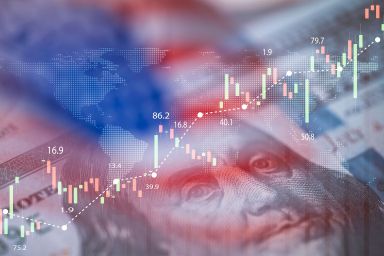Featured articles

Why Michael Burry just sold all his tech stocks
Michael Burry has just exited a nearly $100 million position on Nvidia that he opened earlier this year.
14:42, 9 October 2025

Gold forecast: Third-party price targets
Gold (XAU/USD) is currently trading at $3,982.94 (as of 6:12pm UTC, 7 October 2025), after briefly crossing $4,000 per ounce for the first time during the session.
14:43, 9 October 2025

How does Elon Musk impact cryptocurrency prices?
In cryptocurrency markets, few individuals command as much attention as Elon Musk. The CEO of Tesla and SpaceX’s tweets, Tesla and Dogecoin announcements, and public statements can trigger periods of heightened volatility, with shifts in buying and selling pressure across digital assets.
13:29, 30 September 2025

10 trading tips to make the most of the Capital.com mobile app
Explore how to get the most out of the Capital.com mobile app with these practical trading tips. From managing risk and setting protective orders to using AI-driven insights and educational tools, discover how to trade more efficiently and stay informed.
3 hours ago

Nvidia stock splits: will NVDA split again?
Over the past two decades, Nvidia has carried out a series of stock splits that trace its evolution from a gaming-focused chipmaker into a major player in AI and data-centre technology.
23 hours ago

Who owns the most Robinhood shares in 2025?
Robinhood Markets has attracted a diverse range of investors since its 2021 Nasdaq Stock Market listing, from major institutions to individual shareholders.
24 hours ago

General Electric stock split: Will GE conglomerate break-up unlock hidden value?
General Electric’s break-up in 2024 ended its long-standing conglomerate structure. The company separated into three publicly traded businesses — GE Aerospace, GE Vernova and GE HealthCare — each focused on a distinct sector.
11:36, 20 November 2025

10 trading tips to make the most of the Capital.com mobile app
Explore how to get the most out of the Capital.com mobile app with these practical trading tips. From managing risk and setting protective orders to using AI-driven insights and educational tools, discover how to trade more efficiently and stay informed.
3 hours ago

How overseas investors can access the NSE Nifty 50 (India 50) Index
Learn how to access the NSE Nifty 50 Index (India 50) as an overseas investor – via ETFs, mutual funds, CFDs and derivatives.
10:47, 19 November 2025

Top ETFs and trading insights
ETFs have become an established way to access a broad mix of markets within a single trade. They combine the flexibility of shares with the diversification of funds, making them a commonly used instrument among both retail and institutional traders.
09:12, 19 November 2025

S&P 500 & NASDAQ Face Re-Rating Risk Amid Liquidity and AI Concerns
Since mid-October, the S&P has fallen around 4%, while the Nasdaq has declined about 5%. There are many reasons for this, and various paths that have led us here over the past month.
15:17, 18 November 2025

10 trading tips to make the most of the Capital.com mobile app
Explore how to get the most out of the Capital.com mobile app with these practical trading tips. From managing risk and setting protective orders to using AI-driven insights and educational tools, discover how to trade more efficiently and stay informed.
3 hours ago

Platinum vs palladium: which metal to choose?
We examine the platinum and palladium markets and the latest trends in supply, demand and pricing for both metals in 2025.
07:32, 14 November 2025

Market Mondays: Shutdown relief drives sentiment higher
Market sentiment improves, lifting equities and weighing on the dollar, as a deal aimed at ending the US government shutdown has passed the Senate
10:50, 10 November 2025

Gold steadies as safe-haven demand increases
Gold sees renewed safe haven interest as investors become more risk-averse, but several hurdles remain ahead
11:23, 5 November 2025

10 trading tips to make the most of the Capital.com mobile app
Explore how to get the most out of the Capital.com mobile app with these practical trading tips. From managing risk and setting protective orders to using AI-driven insights and educational tools, discover how to trade more efficiently and stay informed.
3 hours ago

US Dollar dips as odds of a rate cut increase despite strong jobs data
The delayed September US jobs data shows a picture of resilience, but markets increase the odds of a rate cut in December
22 hours ago

Best currency pairs to trade at night
What are the pros and cons of night trading, and how can you choose the right currency pair for your trading strategy?
14:31, 18 November 2025

Market Mondays: Shutdown relief drives sentiment higher
Market sentiment improves, lifting equities and weighing on the dollar, as a deal aimed at ending the US government shutdown has passed the Senate
10:50, 10 November 2025

10 trading tips to make the most of the Capital.com mobile app
Explore how to get the most out of the Capital.com mobile app with these practical trading tips. From managing risk and setting protective orders to using AI-driven insights and educational tools, discover how to trade more efficiently and stay informed.
3 hours ago

How many BONK coins are in circulation in 2025?
BONK, a meme-based cryptocurrency developed on the Solana blockchain, has drawn attention for its community-driven origins and growing presence across decentralised platforms.
18 hours ago

How many Shiba Inu coins are there in 2025?
Shiba Inu (SHIB) is one of the most widely recognised community-led cryptocurrencies, noted for its distinctive origins and evolving ecosystem. Although SHIB began as a meme token, it has since introduced practical features such as token burns and decentralised finance (DeFi) integrations, which continue to influence its role within the broader crypto landscape.
23 hours ago

Who owns JasmyCoin (JASMY) in 2025?
JasmyCoin (JASMY) is a cryptocurrency token built on the Ethereum blockchain, developed by Japan’s Internet of Things (IoT) company, Jasmy Inc.
15:22, 19 November 2025
